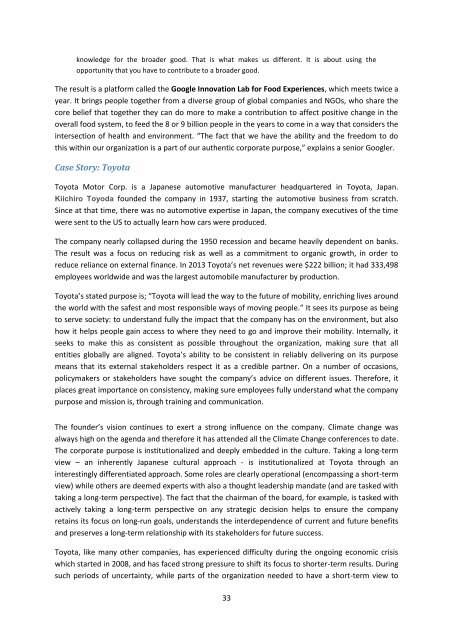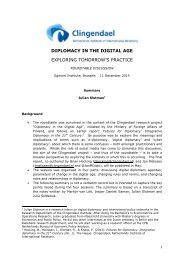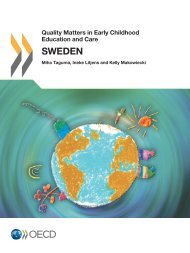BM_IMD_REPORT-How-Authentic-is-your-Corporate-Purpose
BM_IMD_REPORT-How-Authentic-is-your-Corporate-Purpose
BM_IMD_REPORT-How-Authentic-is-your-Corporate-Purpose
You also want an ePaper? Increase the reach of your titles
YUMPU automatically turns print PDFs into web optimized ePapers that Google loves.
knowledge for the broader good. That <strong>is</strong> what makes us different. It <strong>is</strong> about using the<br />
opportunity that you have to contribute to a broader good.<br />
The result <strong>is</strong> a platform called the Google Innovation Lab for Food Experiences, which meets twice a<br />
year. It brings people together from a diverse group of global companies and NGOs, who share the<br />
core belief that together they can do more to make a contribution to affect positive change in the<br />
overall food system, to feed the 8 or 9 billion people in the years to come in a way that considers the<br />
intersection of health and environment. “The fact that we have the ability and the freedom to do<br />
th<strong>is</strong> within our organization <strong>is</strong> a part of our authentic corporate purpose,” explains a senior Googler.<br />
Case Story: Toyota<br />
Toyota Motor Corp. <strong>is</strong> a Japanese automotive manufacturer headquartered in Toyota, Japan.<br />
Kiichiro Toyoda founded the company in 1937, starting the automotive business from scratch.<br />
Since at that time, there was no automotive expert<strong>is</strong>e in Japan, the company executives of the time<br />
were sent to the US to actually learn how cars were produced.<br />
The company nearly collapsed during the 1950 recession and became heavily dependent on banks.<br />
The result was a focus on reducing r<strong>is</strong>k as well as a commitment to organic growth, in order to<br />
reduce reliance on external finance. In 2013 Toyota’s net revenues were $222 billion; it had 333,498<br />
employees worldwide and was the largest automobile manufacturer by production.<br />
Toyota’s stated purpose <strong>is</strong>; “Toyota will lead the way to the future of mobility, enriching lives around<br />
the world with the safest and most responsible ways of moving people.” It sees its purpose as being<br />
to serve society: to understand fully the impact that the company has on the environment, but also<br />
how it helps people gain access to where they need to go and improve their mobility. Internally, it<br />
seeks to make th<strong>is</strong> as cons<strong>is</strong>tent as possible throughout the organization, making sure that all<br />
entities globally are aligned. Toyota’s ability to be cons<strong>is</strong>tent in reliably delivering on its purpose<br />
means that its external stakeholders respect it as a credible partner. On a number of occasions,<br />
policymakers or stakeholders have sought the company’s advice on different <strong>is</strong>sues. Therefore, it<br />
places great importance on cons<strong>is</strong>tency, making sure employees fully understand what the company<br />
purpose and m<strong>is</strong>sion <strong>is</strong>, through training and communication.<br />
The founder’s v<strong>is</strong>ion continues to exert a strong influence on the company. Climate change was<br />
always high on the agenda and therefore it has attended all the Climate Change conferences to date.<br />
The corporate purpose <strong>is</strong> institutionalized and deeply embedded in the culture. Taking a long-term<br />
view – an inherently Japanese cultural approach - <strong>is</strong> institutionalized at Toyota through an<br />
interestingly differentiated approach. Some roles are clearly operational (encompassing a short-term<br />
view) while others are deemed experts with also a thought leadership mandate (and are tasked with<br />
taking a long-term perspective). The fact that the chairman of the board, for example, <strong>is</strong> tasked with<br />
actively taking a long-term perspective on any strategic dec<strong>is</strong>ion helps to ensure the company<br />
retains its focus on long-run goals, understands the interdependence of current and future benefits<br />
and preserves a long-term relationship with its stakeholders for future success.<br />
Toyota, like many other companies, has experienced difficulty during the ongoing economic cr<strong>is</strong><strong>is</strong><br />
which started in 2008, and has faced strong pressure to shift its focus to shorter-term results. During<br />
such periods of uncertainty, while parts of the organization needed to have a short-term view to<br />
33








